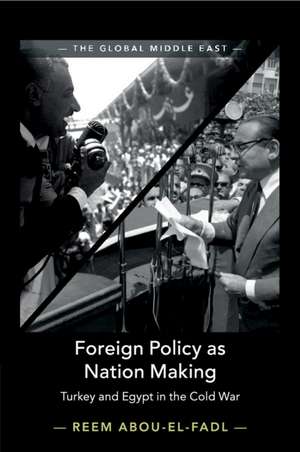Foreign Policy as Nation Making: Turkey and Egypt in the Cold War: The Global Middle East, cartea 6
Autor Reem Abou-El-Fadlen Limba Engleză Paperback – 17 iun 2020
Din seria The Global Middle East
-
 Preț: 153.41 lei
Preț: 153.41 lei -
 Preț: 209.78 lei
Preț: 209.78 lei -
 Preț: 238.40 lei
Preț: 238.40 lei -
 Preț: 231.82 lei
Preț: 231.82 lei -
 Preț: 202.83 lei
Preț: 202.83 lei -
 Preț: 178.53 lei
Preț: 178.53 lei -
 Preț: 247.76 lei
Preț: 247.76 lei -
 Preț: 237.96 lei
Preț: 237.96 lei -
 Preț: 186.61 lei
Preț: 186.61 lei -
 Preț: 231.09 lei
Preț: 231.09 lei -
 Preț: 270.07 lei
Preț: 270.07 lei -
 Preț: 193.71 lei
Preț: 193.71 lei -
 Preț: 356.91 lei
Preț: 356.91 lei -
 Preț: 203.50 lei
Preț: 203.50 lei - 11%
 Preț: 583.56 lei
Preț: 583.56 lei - 11%
 Preț: 640.30 lei
Preț: 640.30 lei -
 Preț: 205.03 lei
Preț: 205.03 lei -
 Preț: 283.03 lei
Preț: 283.03 lei - 11%
 Preț: 638.22 lei
Preț: 638.22 lei -
 Preț: 221.32 lei
Preț: 221.32 lei -
 Preț: 246.61 lei
Preț: 246.61 lei - 11%
 Preț: 705.53 lei
Preț: 705.53 lei - 11%
 Preț: 638.56 lei
Preț: 638.56 lei - 5%
 Preț: 805.74 lei
Preț: 805.74 lei -
 Preț: 286.85 lei
Preț: 286.85 lei -
 Preț: 321.52 lei
Preț: 321.52 lei
Preț: 322.04 lei
Nou
Puncte Express: 483
Preț estimativ în valută:
61.64€ • 66.98$ • 51.81£
61.64€ • 66.98$ • 51.81£
Carte tipărită la comandă
Livrare economică 21 aprilie-05 mai
Preluare comenzi: 021 569.72.76
Specificații
ISBN-13: 9781108468442
ISBN-10: 1108468446
Pagini: 383
Dimensiuni: 230 x 150 x 15 mm
Greutate: 0.52 kg
Editura: Cambridge University Press
Colecția Cambridge University Press
Seria The Global Middle East
Locul publicării:Cambridge, United Kingdom
ISBN-10: 1108468446
Pagini: 383
Dimensiuni: 230 x 150 x 15 mm
Greutate: 0.52 kg
Editura: Cambridge University Press
Colecția Cambridge University Press
Seria The Global Middle East
Locul publicării:Cambridge, United Kingdom
Cuprins
List of figures; Acknowledgements; Introduction; 1. Empire and nationalism in Turkey and Egypt: 1839–1950; 2. The Democrats in opposition: imagining a 'Little America'; 3. The Free Officers in opposition: imagining revolution; 4. Turkey's accession to NATO, 1950–52: members of the 'free world'; 5. Neutralism and pan-Arabism in Egypt, 1952–54: securing sovereignty; 6. Turkey and the Baghdad Pact, 1955: 'freeing' the Middle East; 7. Egypt from the Baghdad Pact to Czech Arms, 1955: shielding sovereignty; 8. Turkey and the Syrian crisis, 1957: linking spheres; 9. Egypt from Suez to Syrian Union, 1956–58: sovereign action; Comparative conclusions; Bibliography; Index.
Recenzii
'Reem Abou-El-Fadl's fine comparative study of Egyptian and Turkish foreign policy in the early Cold War throws penetrating new light on how foreign policy can serve national development strategies in LDCs [Least Developed Countries]. Using an innovative theoretical framework that links theories of IR [International Relations] and nationalism, it also breaks new theoretical ground that can be usefully applied to other cases.' Raymond Hinnebusch, University of St. Andrews
'This historically grounded, empirically rich and thoroughly comparative analysis of the interplay between foreign policy-making and national self-fashioning in Egypt and Turkey during the 1950s offers a challenging new perspective that scholars of international relations and comparative politics would do well to engage with.' Zachary Lockman, New York University
'In this empirically rich and theoretically sophisticated study, Reem Abou-El-Fadl shows that the diametrically opposed positions Egypt and Turkey assumed vis-à-vis the west in the 1950s derived directly from their respective projects of nation making. El-Fadl's book is an essential reading for anyone who wants to understand the link between domestic and international politics in Global South, both in the twentieth and in the twenty-first century.' Resat Kasaba, University of Washington
'This historically grounded, empirically rich and thoroughly comparative analysis of the interplay between foreign policy-making and national self-fashioning in Egypt and Turkey during the 1950s offers a challenging new perspective that scholars of international relations and comparative politics would do well to engage with.' Zachary Lockman, New York University
'In this empirically rich and theoretically sophisticated study, Reem Abou-El-Fadl shows that the diametrically opposed positions Egypt and Turkey assumed vis-à-vis the west in the 1950s derived directly from their respective projects of nation making. El-Fadl's book is an essential reading for anyone who wants to understand the link between domestic and international politics in Global South, both in the twentieth and in the twenty-first century.' Resat Kasaba, University of Washington
Notă biografică
Descriere
A comparison of Turkey's and Egypt's diverging foreign policies during the Cold War in light of their leaderships' nation making projects.
